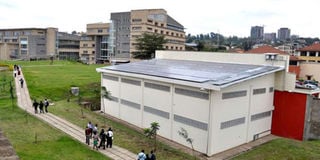Strathmore launches sustainability centre

A Strathmore University building fitted with solar panels. Strathmore Business School on Monday launched the first Center for Sustainability Leadership in the region. PHOTO | GERALD ANDERSON | NATION MEDIA GROUP
What you need to know:
- The Strathmore Centre for Sustainability Leadership will focus on building long-term leadership thinking and provide operational solutions to business challenges in a sustainable way in East Africa.
- “The world as we know it is changing drastically. We as business leaders need to play a pivotal role in sustainable development and mitigate the challenges affecting us,” said Mr Geoffrey Odundo, Chief Executive Officer of the NSE who officially launched the centre.
Strathmore Business School on Monday launched the first Center for Sustainability Leadership in the region.
The centre is aimed at supporting business leaders in shaping and adopting more environmentally-friendly and socially inclusive business practices.
“It is our responsibility to train and equip our current and future business leaders with a strong understanding of and the solutions to the challenges we face around sustainable development,” said Dr George Njenga, the founding Dean and Deputy Vice Chancellor of Research at Strathmore Business School.
The institution kicked of the flagship African Sustainability Leadership programme during the launch to offer training to business leaders from different business leaders from fast moving consumer goods (FMCG), banking, and manufacturing industries in the region.
The Strathmore Centre for Sustainability Leadership will focus on building long-term leadership thinking and provide operational solutions to business challenges in a sustainable way in East Africa.
The programme in line with the Sustainable Development Goals which came into effect this year following the unveiling by the United Nations in September 2015. The Global Goals define the need for business leadership and sector-wide collaboration to achieve economic, social and environmental opportunity for all, and that no one is left behind.
PRIVATE SECTOR
SDGs require the involvement of the private sector, civil society and government to facilitate successful adoption over the set target of 15 years. Countries adopted the set of goals to end poverty, protect the planet, and ensure prosperity for all as part of a new sustainable development agenda.
The SDGs seek to build on the Millennium Development Goals and complete what they did not achieve. They seek to realise the human rights of all and to achieve gender equality and the empowerment of all women and girls. They are integrated and indivisible and balance the three dimensions of sustainable development: the economic, social and environmental.
“The world as we know it is changing drastically. We as business leaders need to play a pivotal role in sustainable development and mitigate the challenges affecting us,” said Mr Geoffrey Odundo, Chief Executive Officer of the NSE who officially launched the centre.
The Centre will concentrate on research, capacity building, entrepreneurship, policy, governance and stakeholder dialogue on sustainable development. The Center is currently running its inaugural African Sustainability Leadership programme developed in partnership with the University of Cambridge Institute for Sustainability Leadership (CISL) and the University of Cape Town.
The next African Sustainability Leadership training programme will take place in November 2016 targeting middle and senior leaders in business, government and civil society.




